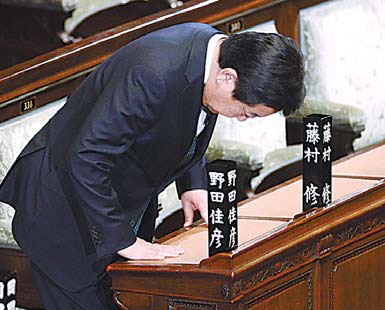Japanese PM dissolves lower house
|
Japanese Prime Minister Yoshihiko Noda bows during a lower house of parliament meeting in Tokyo on Thursday. Toru Yamanaka / Agence France-Presse |
Tokyo also confirms its new envoy to China will arrive in late December
Tokyo kicked off its political reshuffling on Friday after Japanese Prime Minister Yoshihiko Noda dissolved the lower house, while pessimism remained over possible future political deadlock as well as Japan's trend of going conservative.
Tokyo also confirmed that its new ambassador to China will arrive in Beijing in December.
Observers said the country's ties with China, which have suffered over the Diaoyu Islands dispute, will face further tests amid the Japanese candidates' tough talk on the issue.
The Japanese House of Representatives was officially dissolved at the plenary session for a general election scheduled for Dec 16. Election campaigning will begin on Dec 4.
The election comes as Japan is struggling to prop up its economy, mend ties with China, re-establish energy policies after the Fukushima nuclear crisis, and reconstruct areas devastated by the March 2011 earthquake and tsunami, Kyodo News Agency said.
The prospect of the Liberal Democratic Party's potential return to power has prompted concerns that the conservative Shinzo Abe, president of the Liberal Democratic Party, will likely be the next prime minister and further fray ties with China, Reuters said.
"We'll restore foreign policy. We will strongly appeal to voters on the need to restore the Japan-US alliance" and "that will help us defend our beautiful country, territories and national interests", Abe said.
Yang Bojiang, a professor of Japanese studies at the University of International Relations in Beijing, said the overall political pursuits highlighted in the upcoming chaotic month will be defined as "going right-wing" as Japan's ties with China deteriorate at this sensitive time.
"The Japanese community, in recent years, has shown an evolving tendency for conservatism. Bitter remarks to fan the nationalist mood for votes will be a theme in the upcoming election for most of the parties involved," Yang said.
Electoral cooperation may be announced on Saturday between two new radical right-wing parties - former Tokyo governor Shintaro Ishihara's Party of Sun, and Osaka Mayor Toru Hashimoto's Japan Restoration Party, Japan's Jiji Press News Agency said.
The new radical parties, aiming to form a "third force" that could challenge the traditional parties, may become a major force if they gain considerable momentum in the election, said Gao Hong, deputy-director of the Institute of Japanese Studies, the Chinese Academy of Social Sciences.
"If they form an alliance with the powerful Liberal Democratic Party to win a majority in the Parliament, Japanese politics may see a change," Gao said.
Feng Wei, an expert on Japanese studies at Fudan University in Shanghai, said Noda's grip on the Cabinet was loosened in the context of overwhelmingly unfavorable approval ratings. Support for Noda's Cabinet slumped to less than 18 percent earlier this week.
"The LDP is likely to retake the top seats. How to face the situation remains a test for the new leadership in China," Feng said.
As for the future agenda in the month before the new ruling party is unveiled, analysts warned about a possible power vacuum in the existing Cabinet.
"The DPJ Cabinet, now a door-keeper during the power transition, seems more helpless than a lame duck, and its legitimacy is being questioned as the party is losing its majority in both the lower and upper houses," Yang Bojiang said.
The Japanese government has made the preliminary decision to dispatch its next ambassador to Beijing in late December.
Masato Kitera, the 59-year-old deputy chief Cabinet secretary, is expected to see the official confirmation of his new Beijing position during next week's Japanese Cabinet meeting, Kyodo News Agency said.
Beijing on Friday said the China is following international routines and relevant procedures related to the arrival of the new Japanese ambassadors.
"Currently, China-Japan ties are in serious difficulty, and every one knows the reason behind it - the unilateral provocations of the Japanese side," Foreign Ministry spokesman Hong Lei said.
Contact the writer at zhangyunbi@chinadaily.com.cn



















